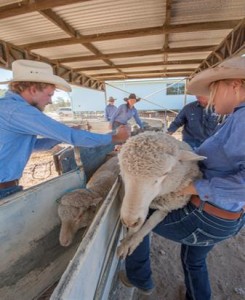Latest listings on our Jobs Central recruitment page:
- Chief Executive – National R&D organisation (Agricultural Appointments client)
- Feedlot Manager- Wonga Plains (Camm Agriculture Group)
- Station Manager – Innamincka (S. Kidman & Co)
- Livestock Export Sales Manager (Austrex)
- Quality Systems Coordinator (AA Co)
- Leading Hand, Wylarah Station (AA Co)
- Station Manager – Rocklands, Qld (Western Grazing Co)
- Quality Assurance Manager – Tallangatta Meat Processors
- Communications Manager – Stakeholder Engagement (MLA)
- Stakeholder Engagement Manager (MLA)
Click here to access these and other recent job listings on Jobs Central.
INTERVIEWING is a skill developed over a period of time. Not everyone is naturally good at it, but everyone can be trained.
It’s not a skill that one is born with – like any other job aspect, it requires training and experience. Of course, if you are a ‘people’ person, you may find it easier to build a rapport with your job candidate and in turn, get the best out of the interview.
To be effective and best utilise your time along with that of your candidates’ you need to be looking for something. Here are five items you need to tick off in order to achieve the best outcome during the interview session.
These points relate as much to a family-scale cattle business with only one or two permanent staff, as they do for a 20,000 head feedlot or corporate-scale grazing property employing dozens of people:
Preparation
Take time to review a resume before meeting the candidate. You don’t have to study the entire document, but review where they have worked, the positions they have held and the accomplishments listed so that you can relate your questions back to their experiences.
Have a conversation, not an interrogation
Spend the first several minutes with someone in small talk on a safe topic so they have a bit more ease and comfort for the interview. However some interviewers may disagree and may do the opposite by putting the candidate on the spot to see how they perform. It depends on the type of person you are looking for – someone who can take the bull by the horns, witty, outspoken or someone who is more laid-back, perceptive or maybe even introverted to balance the scales. Regardless of how you approach it, make it a dialogue, not an interrogation – give your candidate an opportunity to talk.
Honesty
Talk about the role, the nuances of success and failure, and what you are specifically looking for. Talk about what’s worked and what hasn’t – how the role has evolved or changed; how you want to build on something that is already in existence or tear down and change everything. Be able to talk openly about the business and prepare to talk about things that are specific to the day-to-day operations of your business, or your management style. Give specific examples that have been problematic with previous employees to see how they would respond to these issues.
What do you really want to know about this person?
How they will fit in with the company? What skill sets will they bring to your team? Can they take what they know and apply it in your role and exceed expectations? It’s important to keep this in mind during the interview, and the best way to get the answers is to be direct. Again, be honest.
Open-ended questions
This is the best tool to see how people think – ask some straight-forward questions and some tricky questions to bring out your candidate’s personality and behaviour without directly asking them. Some examples are:
- Why are you here?
- What attracted you to apply for work with us?
- How would your best friend/ colleague describe you?
- Tell me about two memorable projects – one success and one failure. To what do you attribute the success and failure?
- What unique experience separates you from other candidates?
- What are your short and long term goals?
The questions can be personal or professional, or both.
Interviewing is an art that requires the complete attention of both parties involved.
Interviewers need to be empathetic, to get beyond the spoken word to grasp the intangibles while the candidate must be well-prepared to back their experiences/credentials and to address the needs of the organisation.
Each party must enable the other to participate equally and freely in a dialogue that seeks to uncover the strengths and weaknesses of the potential recruit.
Source: AWX Agri – Partners in People.




HAVE YOUR SAY